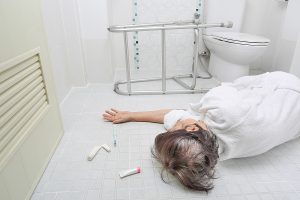The Severity of Slip and Fall Accidents in Nursing Homes
 Michael Babboni
Personal Injury
Slip and fall accidents can result in severe injuries, even for healthy individuals. However, the effects can be much more devastating when the victim is an elderly resident in a nursing home. When elderly individuals become hurt, it can take much longer to recover, and the injuries can be more severe.
Michael Babboni
Personal Injury
Slip and fall accidents can result in severe injuries, even for healthy individuals. However, the effects can be much more devastating when the victim is an elderly resident in a nursing home. When elderly individuals become hurt, it can take much longer to recover, and the injuries can be more severe.It has been reported that at least one in four Americans over the age of 65 experiences a slip and fall accident each year. They have also resulted in approximately 27,000 deaths each year.
Traumatic Brain Injury
One of the devastating injuries one can sustain from a slip and fall accident is a traumatic brain injury, otherwise known as a TBI. Individuals over the age of 75 experience more TBIs than any other age group. A TBI will not heal as quickly in an older person as it does in younger, healthier individuals that fall. Some may even require full-time care and assistance following the slip and fall accident if they sustain a TBI.
Fractures
When we age, our bones begin to deteriorate, and bone fractures happen much more easily in older individuals. The bones break down at a much higher rate as we age, and new bone growth significantly decreases. For this reason, the bones become much more fragile. So, when an older individual experiences a slip and fall, they may require longer hospitalization, surgical procedures, and more long-term care as a result.
Cuts and Bruises
There is also the risk of cuts and bruises during a slip and fall. Aging individuals may have poor balance and find it difficult to walk. So, during a fall, they may also find it difficult to avoid landing on objects that can cut them or cause more harm. Our blood clotting ability is also lessened as we age, which is another factor when lacerations are sustained during this kind of accident. There may be increased weakness and blood loss as a result.
Death
Finally, there is also a higher chance of death when elderly individuals slip and fall; this can occur even if the injuries only appeared to be mild. There can be excessive bleeding, head trauma, and other injuries that are too severe which causes a much higher likelihood of death.
Slip and Fall Prevention
So, what can we do to help prevent slip and falls in nursing homes and avoid these devastating consequences? The staff at the nursing home have a duty of care that needs to be followed to help prevent any unnecessary injury. Safety equipment and other safety guidelines and policies also need to be put into place to help prevent these accidents as well.
Assess Fall Risk
Residents of nursing homes should be assessed to help determine what their fall risk may be. If they have underlying health conditions, have difficulty getting around, and other impaired mobility, then they may be at a much greater risk.
Proper Footwear
The right footwear should be worn at all times. While a nursing home cannot direct residents on what footwear they need to be wearing, they should still offer suggestions on adequate footwear support and footwear that can help with stability. Even this small gesture can go a long way in minimizing fall risk for the residents.
Maintain the Floors
Slippery floors should also be avoided at all times. Even for those with no mobility issues, a slippery floor can be dangerous. Clean and dry floors should be maintained, and if there is a spill, then quick methods and processes need to be used to make sure the mess is attended to immediately.
Eliminate Tripping Hazards
Finally, one other thing that can be done to minimize the risk of falls in a nursing home is to remove all tripping hazards. If a senior trips, it can be difficult for them to regain their footing and their inability to balance can result in a fall.
If a loved one has experienced a slip and fall accident in a nursing home, don't hesitate to contact an experienced personal injury attorney who can help.
